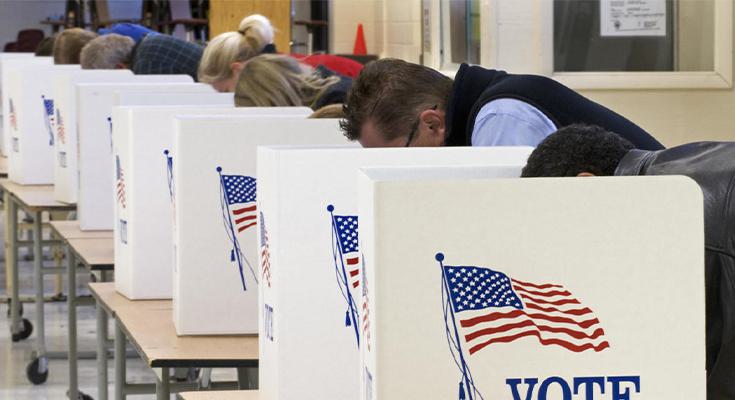The Southern Poverty Law Center (SPLC) pledged $100 million to "support voter engagement and pro-democracy groups in Deep South through 2032," and Alabama Secretary of State John Merrill responded to allegations that the state's voting system isn't fair.
The money will be distributed through the SPLC's Vote Your Voice Initiative, which distributes grants to local organizations. The program was started in 2020 and is meant to create an infrastructure of different groups that attempt to boost voter turnout and inform voters of various issues in local communities.
"The commitment represents a historic pledge of resources to multiracial democracy initiatives in the South and marks a more-than-threefold increase over the SPLC's initial commitment of $30 million, pledged in 2020," the SPLC stated in a press release.
According to Will Tucker, an investigative reporter, the Vote your Voice Initiative will provide less restrictive voting options for disenfranchised voters in Alabama.
"The goals of Vote Your Voice are to support Black- and Latinx-led voter outreach organizations often ignored by traditional funders; support and prototype effective voter engagement strategies; and re-enfranchise returning citizens despite intentional bureaucratic challenges," Tucker said.
Merrill said he disagrees with the assessments of the SPLC.
"If we are doing such a good job at suppressing people from participating in the election process, why do we have record numbers of people registering to vote in this state?" Merrill said. "Ninety-eight percent of eligible African Americans are registered to vote."
Merrill said over 92% of the population of Alabama is registered to vote. We now have 3,615,812 registered in the state as of today," Merrill said.
"The fight for voting rights has always been a ground fight, one led by organizers in our local communities," SPLC Senior Staff Attorney Caren Short told Tucker. "Voter suppression may look different now than it did in the early 20th century, but its purpose and impact is the same: to disenfranchise Black people, young people, those with low incomes and people with disabilities. The Vote Your Voice grantees are continuing the long fight against voter suppression that began in Alabama, working every day to ensure that the voices of all Alabamians are heard."
The SPLC believes that, despite the record voter turnout in 2020, voter suppression is still rampant in the South.
According to a 2020 report from the SPLC, which analyzed supposed voter suppression in the state, Alabama's voting process makes it difficult for some citizens to cast their ballot. According to the SPLC, previous Alabama laws that prohibited felons from voting have had lingering effects on the population. Until 2017, The 'moral turpitude' standard was used to determine if someone had been disqualified from the vote.
According to the SPLC, 'moral turpitude' was an ambiguous term that gave each county the discretion to decide which crimes involved moral turpitude. Moral turpitude was defined in 2017 after a lawsuit pushed the state to create an official list of specific felonies that clarified the statute.
'We don't get any credit for streamlining the application process and making the moral turpitude standards uniform," Merrill said
Despite legal clarification in 2017, the SPLC believes that many in the state would be unaware of their right to vote.
"Many people who are now eligible to vote remain unaware that the law has changed because there was no state-supported voter education effort," the report read. "Those who have heard about the change can apply to have their voting rights restored, but the application process is unnecessarily complex. Moreover, individuals must have paid all their legal financial obligations to the court before they can register – an impossible task for many low-income people."
Merrill said he has increased efforts to ease the process of regaining voting rights for those convicted of felonies. He has also said that the application process to restore voting rights is "easy" because a packet is provided to released inmates by Pardons and Paroles, which thoroughly details the application process.
"In 2016, we prevented the accrual of fines and fees, so they don't compound while they are incarcerated. We also developed a streamlined application process where they can regain their voting rights after restitution has been paid."
Despite the efforts of Merrill, the SPLC claims there continues to be a disparity in voting turnouts. They also claim Alabama's decentralized voting process can create a lack of election oversight.
"Decentralization, however, creates a system with limited oversight, lack of accountability and little uniformity from county to county," The report read. "This fragmentation is confusing for voters and government officials alike. It also makes it difficult to hold anyone responsible for errors. Overall, the absence of accountability and consistency in Alabama's elections infrastructure hurts the state's voters and makes casting a ballot an overly bureaucratic process."
Merrill said Alabama's election procedures are amongst the strongest in the nation, claiming that it has been rated as #1 in the country for election security by four different entities.
Heritage.org rates Alabama as second in the nation on its election scorecard. The state scored an 82 out of 100. Georgia was ranked number one.
To connect with the author of this story, or to comment, email Craig.Monger@1819News.com.










